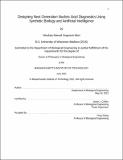Designing Next Generation Nucleic Acid Diagnostics Using Synthetic Biology and Artificial Intelligence
Author(s)
Angenent-Mari, Nicolaas Manuel
DownloadThesis PDF (4.196Mb)
Advisor
Collins, James J.
Terms of use
Metadata
Show full item recordAbstract
Nucleic Acid Testing (NAT) is an indispensable tool for effective disease diagnosis. Analyzing pathogen and host RNA or DNA often provides otherwise unobtainable information necessary for proper patient treatment. Unfortunately, a number of technical barriers prevent the expansion of NAT technology into novel application spheres, such as wearable, digital, and direct-to-consumer or point-of care diagnostic testing. These limitations include the cost of NAT, the equipment needed to perform it, and assay sensitivity. No available technologies have simultaneously achieved the combination of a consumer-tolerable cost, equipment-free passive operation, and gold standard sensitivity. The design of novel assays that overcoming all such limitations in concert would allow for the deployment of NAT in previously unprecedented environments, improving the range and accessibility of crucial disease monitoring.
In this thesis I outline four efforts to expand the capacity of NAT in this direction. First, I describe the design of a novel CRISPR-Cas13 activated riboswitch which demonstrates the potential of synthetic biology tools for nucleic acid detection. Second, I describe the prototyping of a platform for the deployment of freeze-dried synthetic biology-based diagnostic assays in wearable formats, including examples of NAT assays and also assays for small molecule analytes. Third, I describe the synthesis and subsequent analysis using deep learning of a toehold switch library, demonstrating the potential for high-throughput AI-guided design of diagnostic tools. Fourth, I describe the design of a novel isothermal nucleic acid amplification method that functions at low temperatures. I conclude by discussing the future direction of NAT technologies, and describe new opportunities for improved health outcomes that could arise from a new generation of diagnostic tools.
Date issued
2021-06Department
Massachusetts Institute of Technology. Department of Biological EngineeringPublisher
Massachusetts Institute of Technology